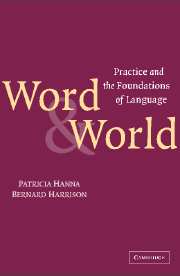12 - Necessity and “Grammar”
Published online by Cambridge University Press: 05 June 2012
Summary
Essence is expressed by grammar.
– Wittgenstein, Philosophical Investivations, §371Extensionality and the analytic
The central claim of metaphysics is that there are de re necessary truths other than those of mathematics and logic. Metaphysically necessary truths, if such exist, were long held to be characterised by the following combination of features:
they capture the nature of Reality,
they are discoverable by rational reflection alone,
they are immune to disconfirmation at the hands of experience.
More recent and fashionable accounts of de re necessity dispense with (2): we shall come to them in a moment.
The tradition of belief in the accessibility to the mind of de re necessary truth is a very long one. It is commmon to Plato and Aristotle, most mediaeval philosophy, the major seventeenth century Rationalists, Kant and such major successors of Kant as Hegel, along with such twentieth century figures as Husserl and Sartre.
Vienna Circle Positivism, the philosophy of Schlick, Carnap, Reichenbach and Ayer, saw itself as committed to the defence of scientific rationality against all such claims. The positivists – although this is a gross oversimplification – held, by and large, that necessary truths are de dicto; a de dicto necessary truth being one that, although immune to empirical disconfirmation, and discoverable by rational reflection alone, cannot be said to capture the nature of Reality, as de re truths have been supposed to do, since the truth of the former is a consequence merely of the way in which we have chosen to give meaning to the signs of our language.
- Type
- Chapter
- Information
- Word and WorldPractice and the Foundations of Language, pp. 261 - 288Publisher: Cambridge University PressPrint publication year: 2003



